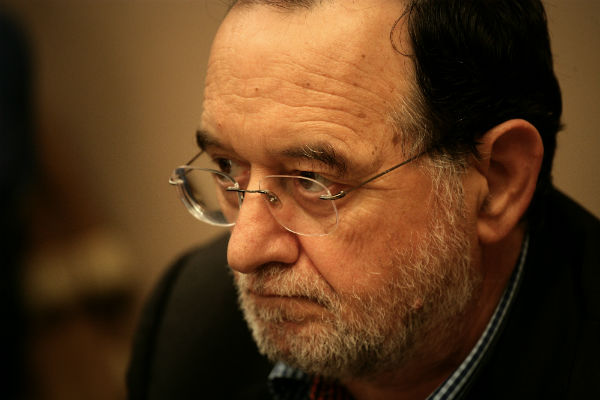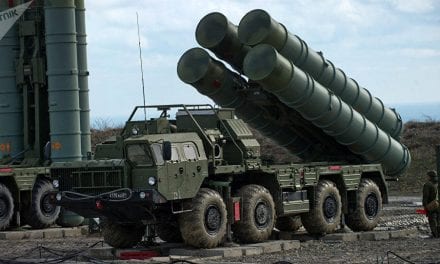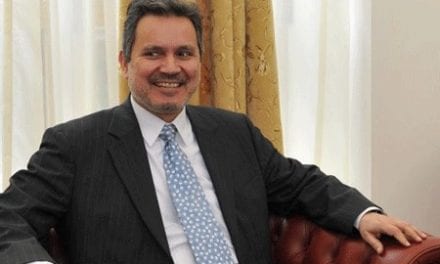Marxist Panagiotis Lafazanis leads a new party in Greece that aims to derail austerity plans.
Τhe leftists’ ruling party of Syriza in Greece faces an existential crisis as its lawmakers and party members who do not agree with the new austerity program are leaving en masse.
Today, 53 of the 201 members of the Central Committee of Syriza submitted their resignations, pointing to their joint resignation letter that as members of the Central Committee they can not serve the new austerity program.
The secession of one-fourth of the members of Syriza’s Central Committee follows the resignation of former Prime Minister Alexis Tsipras last Thursday. Tspiras resigned after a rebellion in his own party over Greece’s new bailout program, which many Syriza lawmakers voted against in Parliament on August 14. His concessions went against his promise to repeal austerity measures.
Moving to a more radical agenda
On this basis, the members of Syriza who fled the leftist party today vehemently criticized Tsipras, stating that the recent developments “will be recorded with black letters in the history of the country but also in the history of the Greek Left.”
The 53 dissidents have already said that they will support the newly formed Popular Unity Party (Laiki Enotita). The leader of the new anti- bailout party is Panagiotis Lafazanis, who is the former Energy Minister of Greece and Syriza’s co-founder. Lafazanis openly blasted Tsipras decision to accept the Eurozone Summit on July 12 and voted against all the austerity bills submitted to the Greek parliament for the new rescue agreement.
On Monday, Lafazanis was granted the maximum three-day mandate from President Prokopis Pavlopoulos to form a government after the main opposition conservative New Democracy leader Vagelis Meimarakis failed to form one. Considering the fast turnaround, Lafazanis is expected to fail. As a result, Greeks will going back to the ballot box on September 20 to vote for a new government for the second time in eight months.
It’s expected that after the forthcoming elections Lafazanis will become the regulator of the political developments, as he will be the main critic of the austerity program, especially if his party takes third place in the elections.
Currently, there are no credible opinion polls in Greece to gauge how the political landscape will shift after the elections. Most political analysts predict that the New Democracy Party and Syriza will compete for first place. Regardless, Lafazanis, will be an ardent political opponent of the new Greek coalition government.
In an exclusive interview with CNBC, Lafazanis discussed his political views. First and foremost, Lafazanis said he aims to abolish the bailout program and cancel austerity plans. As he explained, “The principles of the Popular Unity Party include the end of national subordination and the need to follow a new independent, sovereign and progressive course.”
Top on the party’s agenda is to restore salaries and pensions to levels before 2010, as well as nationalize banks and private monopolies. The Popular Unity leader is a former member of Greece’s Communist Party, and is opposed to Syriza’s transformation from a party of the radical left which seeks the extensive government intervention in the economy to a European socialist party which practices modern capitalism.
“Popular Unity wants to continue the best programmatic traditions of Syriza. We want to stick to more radical commitments,” he said, explaining that he will support a decentralized economy run by trade unions, workers’ councils, cooperatives municipalities and communes.
Many in Greece believe that the momentum of the Popular Unity threatens Syriza as it reduces the number of votes needed for its election independence. “Alexis Tsipras gave up all the substantive and fundamental programmatic commitments of Syriza,” Lafazanis said. “And he accepted a loan agreement that calls for destructive policies—including wage and pension cuts—which may give the final blow to the Greek economy.”
Lafazanis, 63, passionately denounced privatizations, tax increases and pension cuts. He believes that the new bailout agreement is deeply flawed and does not solve the vicious downward economic cycle Greece has been experiencing since 2010. “Greece is not for sale,” he stressed.
Looking ahead the leftist politician believes that an orderly Grexit from the euro area with a progressive program is a viable option. “If it is necessary in order to implement our program, we will not hesitate to leave the euro zone and re-establish a national currency. I don’t believe these actions will be hell for Greece as the euro area propagandists claim,” said the Popular Unity leader.
Just last month Germany’s Finance Minister Wolfgang Schaeuble questioned the bailout deal for Greece as well and had a plan to push Greece out of the euro zone. Chancellor Merkel rejected his initiative. “I don’t know whether Wolfgang Schaeuble now supports Grexit, but he helped formulate the bailout deal. In fact, most of the anti-social proposals contained in this memorandum are Schauble’s proposals,” Lafazanis said.
An active Marxist, he argues that specific European interest groups and political parties in Germany and elsewhere are “leading Europe in totalitarian directions. … They hope the upcoming elections will lead to more popular support for the austerity program,” he said.
The politician’s distrust of Western Europe has made him look east towards Russia. Lafazanis has even named his web site “iskra” which was the title of the first newspaper edited by Lenin to promote the ideals of the social democratic labor party.
It is no coincidence that Lafazanis has worked hard this year to deepen the relations between Greece and Russia in energy sector. He has been involved in discussions with Russia on a planned gas pipeline that would run through Greece from Turkey’s border to Central Europe.
Lafazanis considers Russia a reliable partner of Greece and he has a deep admiration for President Vladimir Putin. “Greece has to develop a new multi-dimensional international policy and to develop our relations with Russia,” he said.



















